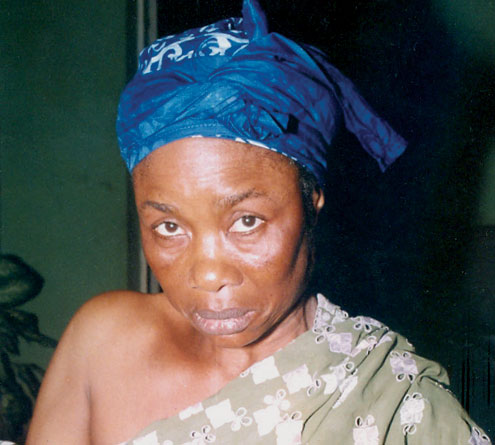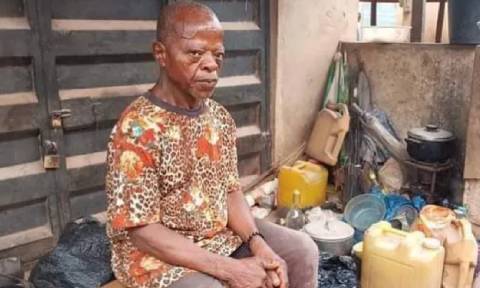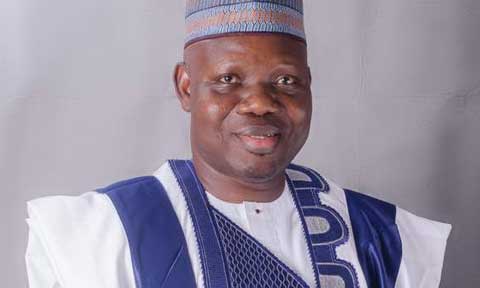For those born in the 60’s and early 70’s, they would be familiar with the musical group “BLOW” which took the nation by storm with their brand of music. The boom in the music industry in the 70’s and 80’s like every other thing in the country, witnessed a downward plunge as piracy began to take its toll on the entertainment business. A member of that group and a music producer of repute, song writer and arranger, Laolu Akins in this interview with Vanguard’s Godfrey Bivbere, speaks on the development of music and entertainment industry generally, prospects, problems and way forward. Excerpts:
Are you satisfied with the level of development in the music industry presently?
Well, one can’t be satisfied because our industry has been plagued with so many problems over time. There is a huge problem of piracy which has become such a menace, there is also the problem of the collective management which, I mean; acting ,directing, particularly music composers, authors, publishers and even the performers themselves. Areas where they ought to benefit from their swea,t from the songs that they write, from the music that they compose, from music they produce, the ones who invest in the music industry, the benefit that is derivable that they are not getting and the various breakdowns within the industry. The disharmony within the industry amongst practitioners, amongst artistes, amongst investors, I can’t say that one is satisfied with level of development. In fact, you can say there has hardly been much development. But there has been development, it’s just that the development that we have had over time cannot be measured with the level of decay that has taken place over time. But again, one can simply say that is the Nigerian story itself because there is high level of decay in Nigeria. There is no light, businesses, talent, character, whatever, you name it, they do not work.
You talked about disharmony amongst the various players in the industry, what are the professionals doing in this regard?
The reason that we have such disharmony is because we have a lot of selfish people amongst us. We also have people who we can say are ignorant about the practices of the business itself, who themselves do not know that certain things need to be put in place for even they themselves to practice appropriately and benefit significantly.
So, people are ignorant, that should be said and people are selfish that also has to be said. As I mentioned earlier, the Nigerian situation is such that for selfish reasons, some people will just want to be on their own, doing their own thing and once they feel that they are all right not minding whether they could be better than they are, feeling that they are all right in their own little pocket, then they can just go on and everything is fine and that is what we have found in Nigeria and the Nigerian character over the years that has not helped growth in any sector of the economy.
Being a professional in the industry and having spent so much time in the industry, I suppose people like you should be in the forefront of bringing people together.
Well yes. Myself and so many others have spent quite a lot of time in the last 20-25 years, working so hard to bring people together in our industry to set the parameters for which we all can operate and benefit accordingly. That the benefit derivable from our industry can be spread amongst all of us rather than me, myself and I. And that we can, sort of, put a foundation in place where, no matter who you are, if you have for instance, a child who is now five years old and say like 10-15 years time, his/her talent has blossomed to the extent that he/she wants to branch or go into music and that is what he or she wants to do, that there would have been a fund for her to grow and prosper in what she wants to do. That is what we have been trying to do over time but there are only few of us that are inclined that way, unfortunately. And when you look over time, be it in Performing Musicians Association of Nigeria (PMAN), be it in the practice of the profession, you can count almost on your fingertips who are the people who have consistently, and I mean consistently stayed in the opposition of “look this is what we should do so that it can be better for us” but alas, they are few. The people who want things done the other way are so many and that is the situation in Nigeria. The people who are holding power in Nigeria and getting the benefit of all of the things that Nigerians themselves; the populace should have, are few. And in our case, those of us who are looking for betterment in our industry are few. Because of survival, this survival syndrome that everybody would just say “I beg make I just do my thing, me I no want trouble.” So people are not bold enough to say look this is not right, let us try and do something else, let us try and do it this way.
But happily, I can say for the first time in a very long time, even though we have tried in the past. The reason that PMAN came to be is so that there will be a formidable musicians union that would sort of look after the interest of the musicians in the way they practice their music, in the way they perform their music, in the mode of the business, how it is run that it can be an arbiter for artiste and recording companies, promoters and artistes. So that in any case, there will be rules and regulations, set rule for each and everyone of us to practice our profession.
Has that purpose been met?
Unfortunately no! We started well. For a number of years, we had certain kind of stability which we thought would continue.
But sooner, changes began coming when different people began attaining offices. The leadership of PMAN began to come with different agenda and ideas that don’t synchronize with the aim of putting PMAN together.
What is PMAN doing about this?
Unfortunately, we can’t say that PMAN has influenced some positive happenings in the industry. We had to move ahead in another way which has brought us to forming another body called The Nigerian Music Industry Coalition. To God be the glory, as young as this organization is, it has made significant impact in the music industry and it makes people like me happy because it shows that we can still right the wrong in the industry.
What are the major problems facing the industry?
One of the major problems facing the industry is piracy and it has become a monster that everybody runs away from. It has got to the extent that even musicians themselves go to pirates and ask them to help compile their songs so that they can be heard. Artistes even go to television and radio presenters, give them money so that they can play their songs. But the industry wasn’t like this. Few years ago, because of the instability in the economy and piracy, all investors withdrew. Foreigners went away. Where are the likes of Rogers today? They’re still there but struggling. Piracy came and put all of them in trouble, they lost so much money and royalties. But the coalition has made efforts not only to fight piracy in their own way but to make so much noise to draw government’s attention to the fact that piracy is killing everybody. We have gone far to get the help of the government, the Police, the Copyright Commission and the Ministry of Justice to apprehend one key pirate. The case is in court. This is one man who has boasted that nobody can stop him and there are many more. If there had not been a coalition, what would have happened? We know that even the one that has been caught will send signals to others, it’s either they’ll go into hiding or face the law. The good news is that we’re not going to give up.
We’ve been able to achieve this because we have co-operated among ourselves. Now in the Coalition we have the investors, the producers, the manufacturers and the artistes themselves. This has also helped to build a solid collective management scheme which is now in progress. We have COSSOM, The Nigerian Music Industry Coalition. So, we have seen that togetherness can bring us bigger success. Over the years, we’d taken many steps but because of the selfishness of some among us, we didn’t make the kind of progress we’re making.
One major worry is what happens to the pirate who has been charged to court, won’t he be discharged without justice?
We can only hope because we’re not in the judicial system. But let me make this clear that, apart from the criminal aspect fo piracy, the owners of the pirated works and companies who own the copyright can now take a civil action against the pirate. Even though we’re still asking the government to review the piracy laws, the penalty the law is asking them to pay is too small! But we have to put the law we already have to work and see where it gets us. As we go on, we’ll continue to put pressure on the government to strengthen and enforce the law.
Can you mention some of the artistes whose works were pirated?
The case is in the court now and all evidences are in the custody of the court. It won’t be wise for us to reveal anything now. But, there’s a list of so many artistes whose works belong to different companies. I’m sure if you follow the case, you can be in court at the next hearing, ask their lawyers some questions and they can give you more facts.
What’s the name of the pirate that was caught?
I have his name but can’t remember it. On the civil aspect of the case, these artistes can sue the pirate to court on the basis of what they’ve been denied. This war is a big war because the pirates are rich because they don’t pay taxes to the government, they don’t pay royalties. This is why we’re asking the government to strengthen the law, maybe visit Alaba and probably close it for a while. And let’s see whether they won’t be flushed out. But beyond Alaba, there are other places the government needs to look into. In the last four years, the pirates in Nigeria have doubled than what we had and it’s an economic sabotage to this country.
In few words, what’s the impact of piracy on the artistes?
It’s a worm that eats up the very fabric of the industry. When an artiste struggles to release works and he’s signed on a contract and he becomes popular, when his works get pirated, the company which had invested on the artiste will be shortchanged. So, the man is denied of revenue, profit, his investment is gone, he can’t invest on other artistes. Even the artiste involved won’t be creative because he hasn’t got any return from what he’s done. He lives in penury, can’t feed himself, and that’s because somebody somewhere has denied them of their income. Now, from the government point, the company involved can’t pay taxes because they’re running at a loss and even the artiste can’t pay tax. Now, the pirates themselves don’t have addresses of operation. So, nobody can be held responsible. So, all the way, there are losses. Why should the few pirates deprive so many of us? Pirates kill talents.
What’s your vision for the Industry?
I’ll base my vision for the industry on what’s happening now. Thank God good things are now happening. We’re hoping that very soon, the Nigerian Copyright Commission will announce one collective management organization that’ll be responsible for the welfare of Nigerian artistes and composers and our foreign counterparts. Therefore, all the royalties that are accruable to artistes, composers, performers from various categories of music, will be gathered and everyone will benefit from what they do. COSSON is not a body that discriminates and it’ll make sure that everybody who owns right within the Music Industry, is catered for. My vision is that these bodies will be the foundation on which the industry springs up again and becomes successful in the nearest future. We must sustain our effort to see that piracy, if not eradicated; is reduced and what belongs to the artistes, the recording companies, the government and every player in the industry, gets to them. We may have disagreement in the house but we will still work together in order to move the country forward.


















